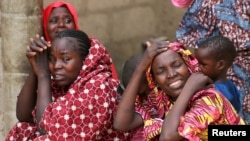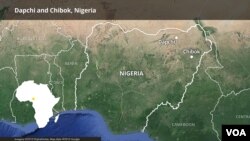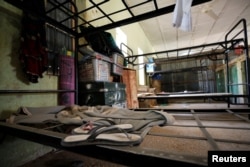The Nigerian government has confirmed that 110 female students from the remote town of Dapchi are missing after suspected Boko Haram militants attacked their school one week ago. While Nigerian authorities have launched an intensive search operation, the action has done little to assuage the anger at how this could happen again.
A remote town in northeastern Nigeria. A government girls' secondary school stormed by gunmen believed to be Boko Haram. Dozens of girls missing. Parents devastated. A town in mourning.
These are flashes of the past week in Dapchi, an old farming community in Nigeria's Yobe State. It feels eerily similar to Chibok in 2014.
Confusion reigned in the initial days following the Dapchi attack, as it did with Chibok, but there have been differences.
In 2014, the federal government response was slow. Within 48 hours of the Dapchi attack, Nigerian President Muhammadu Buhari tweeted that he was sending a delegation to the town and ordering military and police deployments to find the missing girls.
Information minister Lai Mohammed visited the community Sunday.
"The total register of the students that came to school on that Monday was 906, but as of today about 110 of them cannot be accounted for. Henceforth the police and the civil defense corps will ensure that their presence is strong in every school to serve as deterrents to insurgents," said Mohammed.
But activists are not placated. The Bring Back Our Girls movement is back on the streets in Lagos and Abuja demanding answers from the government.
Aisha Yesufu, one of the faces of the Bring Back Our Girlsmovement, said the similarities between Chibok in 2014 and Dapchi in 2018 are too striking.
"We've had this before. Didn't we learn anything? We have refused to even assimilate what is going on because it's heartbreaking.Four years invested, seeing parents crying, seeing how much their lives have been shattered and then we're coming again and another set of parents are going to go through the same thing," said Yesufu.
The names of 105 missing girls from Daichi were released over the weekend. The residents of Dapchi are angry. When the Yobe state governor came to visit, they threw rocks at his motorcade. Residents are gathering every day to protest.
The Nigerian Air Force says it has deployed additional aerial assets to search for the girls day and night. A security analyst told VOA it is still "early days" and some of the girls could surface after hiding in the bush.
Bring Back Our Girls activist Emman Shehu said the government failed in letting this happen again but there is some cause for hope.
"The difference now is there is a response, even though it's a late response. The government has been to the place several times, which didn't happen in Chibok. Now the federal government has put out a proper list, which didn't happen in 2014. Now there is talk of a rescue operation, which didn't happen in 2014. The Dapchi girls may be lucky this time around," said Shehu.
It was April 14, 2014, the day Boko Haram kidnapped 276 female students from Chibok. The mass abduction became emblematic of the Islamist radical group's insurgency.
Some of the Chibok girls have escaped, others have been freed via negotiation. But 112 Chibok girls are still missing.
A regional military offensive that began in 2015 has reclaimed much of the territory Boko Haram once held. Speaking Monday to VOA's Daybreak Africa, information minister Mohammed said the Sambisa forest, Boko Haram's largest stronghold, has been leveled.
But the brazen attack in Dapchi is casting fresh doubt on President Buhari's repeated claims that Boko Haram has been defeated.







